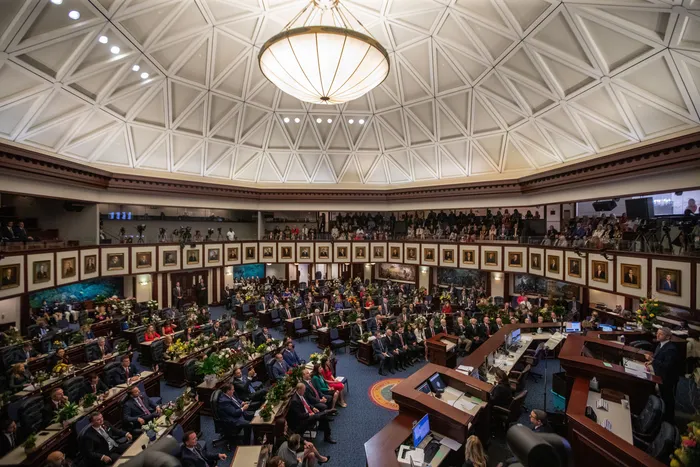In a world where social media platforms have become the primary channels for communication and expression, the most recent passing of the HB-1 bill in the Florida House of Representatives sparks intense debate. While policymakers argue that it aims to protect children from harmful content on social media, the bill poses a significant threat to the First Amendment rights of children.
The HB-1 bill was passed on January 24th in a 106-13 vote and imposes extremely, stringent regulations on social media platforms for those under the age of sixteen. The bill would require social media applications to prohibit minors from creating new accounts, terminate existing accounts, and use new methods to verify the ages of account holders. Even if a parent allows their child to download one of these applications, they will be unable to create an account as they will have to show some kind of identification.

Other states such as Ohio, Arkansas, and Utah have tried to pass similar bills restricting social media but all have been stopped by lawsuits. The Ohio, Arkansas, and Utah bills all required parental consent for those under the age of sixteen to use social media. NetChoice, a tech company, has challenged the constitutionality of the law in Ohio and Utah and has sued the state of Arkansas for violating the First Amendment. The HB-1 bill will not even allow for social media use with parental consent making the proposition one of the strictest laws in the country.
While the intentions behind these measures may be to “protect” children from online harms, they come at a significant cost to children’s First Amendment rights. The First Amendment guarantees the right to freedom of speech and expression to all. By imposing these restrictions on children’s ability to even access these platforms, the bill effectively limits their ability to speak for themselves and exercise these rights.
The bill completely strips away children’s right to choose how they engage with people online. Instead of allowing young people to make informed decisions about their online activities, the bill imposes restrictions that prevent them from exercising their autonomy. How can one claim to protect children’s rights when the bill strips away their fundamental freedoms? Are children below the age of sixteen not guaranteed First Amendment rights?
The bill further sends a message that children are incapable of making responsible choices online and must be shielded from certain forms of communication and information, regardless of their individual circumstances or maturity. Not all children are the same, and not all need to be regulated by the government. The bill fails to recognize the diverse experiences of children and treats them as one similar group.
The intention of those who have passed the bill is understandable. Social media platforms can be a dangerous place specifically for children. The idea of protecting children from cyberbullying or online harassment is admirable, but this bill is not the solution.
Instead of resorting to regulations that restrict freedoms, lawmakers should focus on addressing these issues by educating children about online safety so that they receive the knowledge they need to make informed decisions and protect themselves from possible online threats. It is important to strike a balance between safety and freedom so that children can be protected from the evils of online while still having access to their constitutional rights.









Brian • Feb 29, 2024 at 8:14 pm
So as a parent I love this bill !!!! As far as a child’s first amendment rights I disagree that this violates them in anyway cause a child can not gain acess to internet with out it being provided by an adult a child can’t call Att and order internet or a phone Can not go to Walmart to buy one with out the money an adult gives him A child in fl has to be 16 to work and the bill follows already established law I see no amendment violation.
Darrell Shortt • Feb 29, 2024 at 12:23 pm
Are children under 16 allowed to have a license or vote? No. The reason is because they are not old or experienced enough to make rational cognitive decisions. The same holds true for social media. Children are highly susceptible to outside influences and must be protected, not given free reign to do what they want.